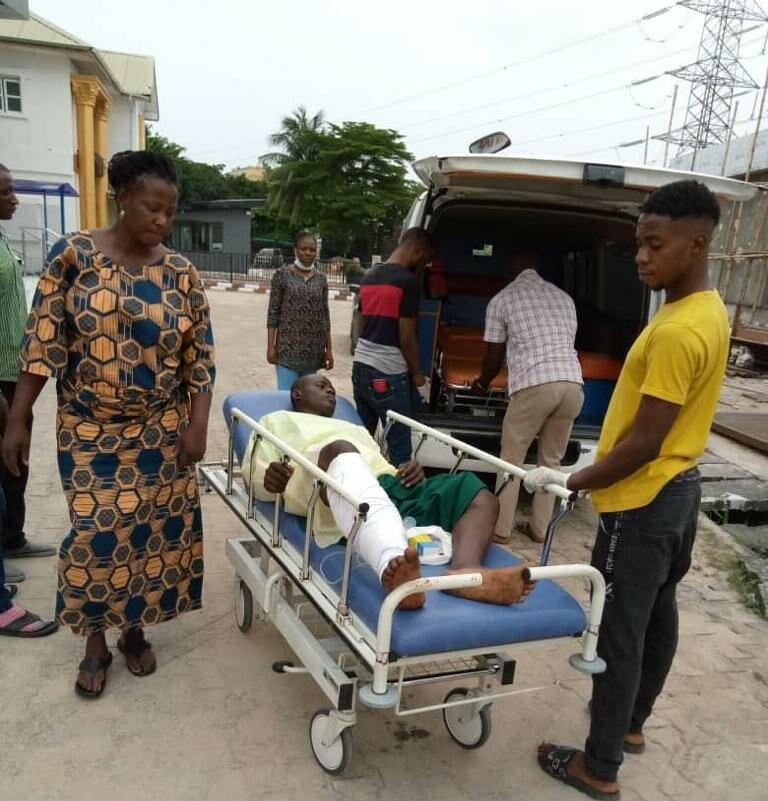On October 20, 2020, Olalekan Falaye joined thousands of young Nigerians to peacefully protest against police brutality. Instead, Falaye lost the ability to walk.
Olalekan Falaye, 23, used to actively move around before soldiers shot at protesters at the Lekki tollgate on October 20, 2020. Now, he cannot walk without a wheelchair. His right leg was amputated as a result of a gunshot injury he sustained on Tuesday, October 20, 2020.
- Kaduna strike: ‘Come and arrest me,’ Wabba tells El-Rufai
- NLC president dares El-Rufai, leads protesters to Kaduna govt house
Falaye, who was protesting at the Lekki tollgate during the peaceful #EndSARS protest last year, said he was shot by soldiers.
Medical records and photos taken before and during his time at the hospital confirm the gunshot.
Falaye’s revelation is yet another piece of evidence backing the allegation that soldiers shot live ammunition at protesters during the Lekki attack, a claim the Nigerian army continues to deny.
“On Tuesday, I decided to join the protests after I closed from work,” Falaye explained. “It was about 7 pm when we were told the soldiers had arrived, that we should not run but sit down on the floor. The soldiers just started shooting up in the air.”

Falaye’s account checked repeated verifications and even part of the military’s narrative. The Commander of 81 Division of the Nigerian Army, Major-General Ahmed Ibrahim Taiwo, revealed while being cross-examined at the Lagos State Judicial panel that the soldiers deployed to Lekki went with live rounds, contrary to the initial stand that the soldiers only fired blanks.
The Nigerian army continued to insist that its soldiers only shot in the air, but that only accounted for a few minutes after the soldiers arrived at the scene. What followed hours later were heinous human rights violations and extrajudicial killings, according to Falaye’s account and investigations carried out by CNN and Premium Times.
“It got to a point, the soldiers faced us (protesters) and started shooting at us. It was at that point that a bullet met me in my leg. It was a good Samaritan who helped me and carried me to Randville, saving my life,” Falaye claimed.
His medical report from Randville Trauma Centre, where he received initial treatment, confirmed that he was indeed shot at Lekki Toll Gate.

“He sustained this injury as a result of his involvement in the EndSARS protest that occurred at Lekki Toll gate,” his medical report read. “The flesh on his leg was torn open by the bullet.”
The hospital recommended amputation, claiming, “no pulse was felt” on his leg. He was subsequently referred to the National Orthopedic Hospital in Igbobi, Lagos, where the procedure was carried out five days later.
Since Falaye’s mother, Temitope, got the news about her son, she said she’s faced a great financial challenge to get him the necessary medical care. It took a hit on both her savings and capital for her food business. She sold noodles by the roadside and offered cleaning services.
“When I got to Igbobi, they said I should go and bring money for a bed. I opened a (patient’s) card, after which I was given a drug prescription. I spent fifty-something thousand the first day alone, and that only accounts for what I could calculate,” the dejected mother said, adding she was only able to afford some of the medical expenses because of help from her church members and friends.

The mother is grateful that Falaye learnt a trade, but she is worried he might not be able to raise capital to start up a shop after coming out of apprenticeship.
“I need them (the government) to help us because even what to eat has now become so hard,” she said.
Background
Days into the nationwide #EndSARS protests, hoodlums alleged to be sponsored by the government, attacked protesters in different states. At least two people were killed in Abuja following the attack.
Following this development, some state governors announced curfews. On the same day the curfew was announced in Lagos, October 20, 2020, the Nigerian army clamped down on protesters in Lekki.
Amnesty International alleges at least 12 people were killed during the attack. A popular Nigerian Disc jockey, DJ Switch, said she counted 15 people who were killed, and their corpses taken away in military vans.

The Nigerian army initially denied its men were present at the toll gate, but after the state governor, Babajide Sanwo-Olu, said during an interview with CNN that soldiers were indeed deployed to the scene, the army rescinded its earlier position.
Evidence has since emerged to show that people were killed or maimed during what has now been dubbed as the #LekkiMassacre. Falaye was one of those maimed during the attack.
This story is part of a multimedia project by Tiger Eye Foundation and media partners across Nigeria, documenting police brutality in Nigeria, and advocating for police reform.

 Join Daily Trust WhatsApp Community For Quick Access To News and Happenings Around You.
Join Daily Trust WhatsApp Community For Quick Access To News and Happenings Around You.


